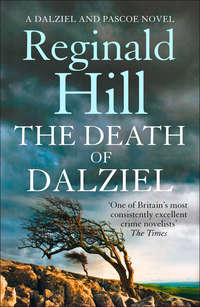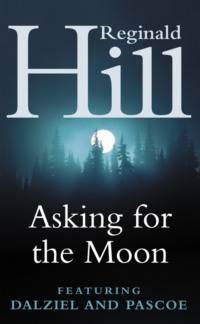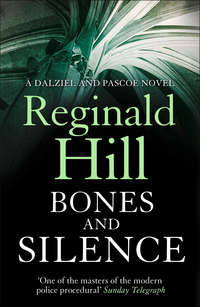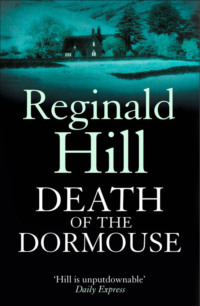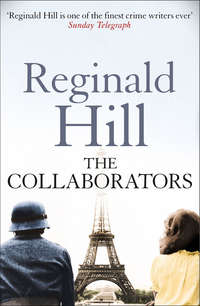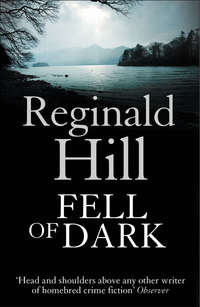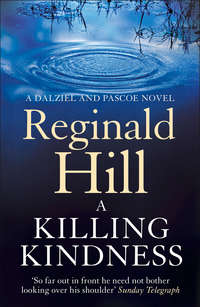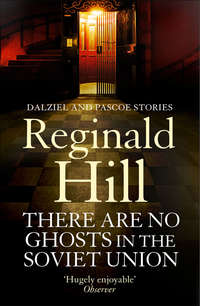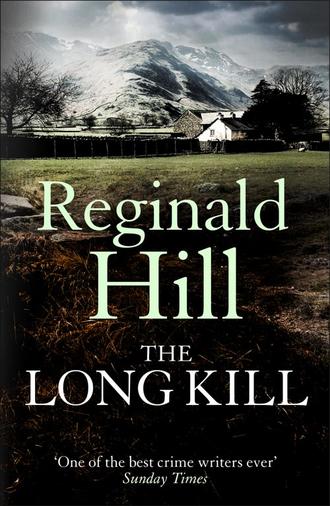
Полная версия
The Long Kill
A moment later a boy of about six ran out onto the terrace. He pulled up short when he saw Jaysmith, then resumed his approach more sedately.
‘Jimmy, this is Mr Hutton. Jay, this is my son, Jimmy.’
‘Hello,’ said the boy. He was small, with his mother’s brown eyes but much fairer both of hair and complexion. His expression at the moment was rather solemn and serious, but any suggestion of premature maturity was contradicted by a chocolate stain under his lower lip and a comprehensive graze of the right knee.
‘Hello,’ said Jaysmith.
He held out his hand. Before the boy could shake it, he turned it over to reveal that there was a fifty-pence piece in the palm. Slowly he made it move across the undulations of his knuckles and back again. Then he tossed it high in the air, caught it with his left hand and immediately offered both hands, fists clenched, to the boy who studied them with that look of calm appraisal Jaysmith knew from his mother.
‘What’s the problem, Jimmy?’ said Bryant after a while.
‘Well, I know it’s in that one,’ said the boy pointing to the left hand. ‘Only, it’s probably not, as it’s a trick, and it’ll be in that one.’
‘You’ve got to choose, Jimmy,’ said Anya. ‘That’s what the game is, choosing.’
Her eyes met Jaysmith’s for a moment.
‘All right,’ said the boy with the certainty of defeat. ‘That one.’
Slowly Jaysmith opened his left hand to show an empty palm.
‘I knew it’d be the other after all,’ said Jimmy with resignation.
Jaysmith opened his right hand. It was empty too. Then he shot his left hand forward and apparently plucked the coin from Jimmy’s ear. He handed it to the boy who took it dubiously and glanced at his mother.
‘Is it mine?’ he asked hopefully.
‘You’d better ask Mr Hutton.’
‘It’s certainly not mine,’ said Jaysmith. ‘Would you want a coin that’s been kept in someone else’s ear?’
The boy laughed joyously and thrust the coin into his pocket.
‘Thanks a million!’ he cried. ‘Mum, what’s for tea?’
‘Nothing till you’ve washed your face and I’ve put some antiseptic on that knee,’ said his mother.
She took him firmly by the hand and led him into the house.
‘Nice kid,’ said Jaysmith. ‘He looks fine.’
‘Why shouldn’t he?’ said Bryant.
‘An only child without a father, it can be tough. Does he talk about him much?’
‘Not to me,’ said Bryant. ‘Children are resilient, Mr Hutton. A boy needs a man around, that’s true. Well, Jimmy’s got me, so that’s all right.’
He spoke with controlled aggression.
‘I’m sure it is,’ said Jaysmith. ‘How long has it been since his father died?’
‘Last December.’
‘What was it? Illness? Accident?’
‘Climbing accident,’ said Bryant shortly. ‘But I think my daughter’s business ought really to be discussed with my daughter, don’t you? Another drop of brandy?’
‘No thanks,’ said Jaysmith rising. ‘It’s late. If school’s out, it’s time I was going. Goodbye, Mr Bryant. Thanks for your help and your hospitality.’
He stretched out his hand. Bryant took it and gave it a perfunctory shake without rising.
‘Glad to have you with us,’ he said. ‘I hope Anya asks you again. Grose will get the conveyance under way.’
He found Anya in the kitchen bathing her son’s knee. The boy’s face was screwed up in mock agony.
‘I must be off,’ said Jaysmith. ‘It’s been a splendid day.’
‘Are you coming to Carlisle with us on Saturday?’ asked the boy.
Jaysmith raised his eyebrows interrogatively.
‘There’s a soccer match,’ said Anya gloomily. ‘He’s conned his grandfather and me into taking him as a pre-birthday treat.’
‘Birthday?’
‘That’s the following Saturday. Fortunately Carlisle United are playing down south that day, so he’ll have to make do with a party instead.’
‘Please come,’ urged the boy.
‘Well, I’d love to come to the party, if I’m asked, but I can’t make the match. I’ve got to go down to London tomorrow and I may have to stay away a couple of days.’
He thought Anya looked disappointed but it may have been wishful thinking.
‘I’ve been to London,’ said Jimmy. ‘Granddad Wilson lives there.’
‘And Mr Hutton will soon be living up here. He’s buying Great-Aunt Muriel’s house.’
The boy digested this.
‘Is Great-Aunt Muriel dead?’ he asked.
‘No, of course not! She’s just moving down into the village. Jay, if you can hang on till I finish with this monster, I’ll see you out.’
Jaysmith said, ‘I’ll use the bathroom if I may.’
He went upstairs and swiftly checked the landing windows. They were double glazed and fitted with what looked like new security locks. He had already noticed an alarm box high up under the eaves. He opened a bedroom door at random. It proved to be Anya’s. The straw handbag she’d been carrying in Keswick was tossed casually onto the bed. He opened it and was amazed at the quantity of bric-à-brac it held. After a little rummaging, he came up with a key ring which he bore off with him into the bathroom. He locked the door and sat on the edge of the bath. Ignoring the car keys, he carefully made prints of the three others in a large cake of soap. It was a process he had seen used in television thrillers but not one he’d ever had occasion to try for himself. Carefully he wrapped the soap in his handkerchief, removed all traces from the keys, flushed the toilet and unlocked the door. Swiftly he made for Anya’s bedroom but stopped dead on the threshold.
Anya was standing by the bed in the process of shaking out the contents of her handbag onto the coverlet.
‘Hello,’ she said, becoming aware of his presence. ‘Won’t be a sec. I wanted my car keys and as usual they seem to have sunk to the bottom. I keep far too much rubbish in here.’
She resumed her shaking. He stepped into the room, put his hands on her shoulders, and spun her round to face him. He drew her to him and kissed her passionately as he dropped the keys onto the bedspread. It was more successful than his attempt on the Crinkles in that she did not thrust him off but nor did she return the kiss and when he broke off she said calmly, ‘Is it the sight of a bed which brings out the brute in you?’
‘I’m sorry,’ he said. ‘I think I just wanted to assure you that I’d be coming back.’
‘Why should I doubt it? After all, you are buying a house up here. Oh, there they are.’
She had turned away from him and seen the keys.
‘Am I moving too fast?’ he asked gently.
‘Not as long as the finance is in order, no,’ she said judiciously. ‘Aunt Muriel won’t want to hang about, you know.’
‘You know what I mean.’
‘I’ve only met you three, no, four times,’ she replied passionately. ‘How on earth should I know if I know what you mean? Or care for that matter?’
She left the room and he followed her down the old creaking staircase. In the hallway he said lightly, ‘You’re well protected, I see.’
She glanced at him to see if he was being ironical, then followed his gaze to the alarm junction box on the wall behind an old-fashioned coat rack.
‘Yes,’ she said. ‘It’s a bit of a nuisance. I keep forgetting.’
Idly he reached up and flicked the box open.
‘It looks pretty new.’
‘It is. We got burgled a couple of months ago. They didn’t take much, but they made a lot of mess and it was rather frightening, being so isolated. So pappy got a firm of security specialists in to tighten things up.’
‘Still here, Hutton? Goodbye once more.’
Bryant had come back into the house and was standing in the doorway of what looked like a study or office.
‘Mum, can I have my tea now?’ demanded Jimmy, appearing at the kitchen door.
Jaysmith looked at the three of them. They appeared as a formidable family group, each splendidly individual perhaps even to the point of willfulness, but very united too. He guessed that it was going to be hard to get one without the approval of the others.
Soon he might have to decide how much he really wanted that one.
But as he followed Anya out of the shady entrance hall into the ambered warmth of the autumn sunlight, and she turned and offered him her hand with a slightly crooked smile which mocked the formality of the gesture, he knew he had decided already.
Chapter 8
He set out for London early on Friday morning while the mists were still grazing the fellsides like the ghosts of old flocks. The pain he felt at leaving all this behind surprised him, but as he’d sat and talked to Bryant the day before, he had known he had to go. Jacob was in London, and only Jacob could tell him why Bryant had been targeted and whether the instruction was still active since the deadline. Further than that, he could not think.
The journey down had a dreamlike quality. He drove with automatic ease, his body at rest in a soundproof cocoon, with soft upholstery, even-temperatured air and gentle music from the stereo cassette. He tried to fix his thoughts on the problems ahead but they kept on drifting back to the quiet joys of the land behind him. Four hours later, when he parked his car and stepped out into the din of Central London, it was like leaving a monastery cell for an iron foundry.
Quickly he made his way to his flat on the west side of Soho. It was twenty years since he had come to live here. The sixties were just beginning to swing. Then, the district’s aura of urban picturesque with hints of Bohemian low-life had seemed a perfect match for the times; the old inhibitions were dying and the age of openness, freedom, and guiltless joy was being born. Not that Jaysmith had been very receptive to such optimism then, but now, for the first time, he was aware with more than just his eyes and ears of the squalid side-channels all that flood of high promise had been diverted into.
What had seemed Bohemian was now Babylonian; what had begun as openness was now exhibitionism; the porn merchants had worked out that there was more money in joyless guilt than guiltless joy, and the only freedom celebrated in these littered streets was the one civil liberty that civilized societies never denied their citizens – their right to seek degradation and self-destruction any which way they liked.
His flat occupied the top floor of a building which had once had a Greek restaurant at street level. Now there was an Adult Video shop. He turned into the doorway leading onto the narrow stair which ran up the side of the building. At the foot of the stairs squatted two youths with their arms round each other. One had his head shaved smooth except for a spikey orange-dyed coxcomb; the other had lank black hair and the ten o’clock shadow of an Arafat beard prickling his jowels and jaw. The Coxcomb had his face in a plastic bag, held tight around the neck. He was breathing in with pig-like snorts and when he raised his face, the glue in the bag was running like mucus round his nostrils and lips. Arafat took the bag, while he stared vacantly at Jaysmith. Neither made any attempt to move out of his way.
Holding back his anger, Jaysmith stepped over them and made his way up the stairs. At his door he paused and looked back in case the glue-sniffers had ambitions to become muggers too. All was quiet. He opened his door. It had two deadlocks on it and the windows had internal steel shutters so that the flat was in complete darkness despite the smokey sunshine outside.
He flicked on the light and glanced at the strip of lightsensitive photographic paper which he always placed on the floor near the door immediately before leaving. As he watched, it turned black.
He poured himself a drink and looked round, horrified at what he saw. There was no shortage of comfort – he’d been given a good start, and the money had come pumping in, thick and regular as arterial blood, after that. But what he had constructed was a prison.
He pressed the rewind-and-play button on his answering machine. There was very little on it. Few people had his number, and fewer of those were likely to be making social calls. In fact only one message caught his attention, not really a message at all, but readable as one.
A man’s voice exclaimed Jaysmith! That was all.
He checked the timing of the call. It had come through less than an hour after he had phoned Enid to cancel his contract on Bryant.
He listened to the word again.
Jaysmith!
The word was distorted in anger, bitten off short as though there was much else to follow but the speaker had recognized the folly of committing it to an answering machine.
Despite the distortion, despite the brevity, he had no difficulty in recognizing the voice. It was Jacob, no doubt of that. That precise, rather nasal accent was unmistakable, even though the usual drily ironic inflexion had been replaced by something approaching rage. Any emotion which brought Jacob so close to breaking his own security must have been extreme indeed.
The flat had two bedrooms, or rather a bedroom and a boxroom. This last contained a small workbench with a vice and various metal working tools. The kind of repairs and modifications Jaysmith occasionally wanted to make to his equipment were not to be doled out to some jobbing craftsman. Now he carefully unwrapped the soap taken from the bathroom at Naddle Foot and set about producing keys which matched the imprints in the cake.
He worked swiftly and with tremendous concentration and ninety minutes later he was satisfied. Carefully he wrapped up the three keys with a small tungsten file for on-the-spot modification and put the resulting package into his inside pocket.
Now he relaxed and realized he was hungry, not having eaten anything since his breakfast at the Crag Hotel. The freezer held a selection of made-up meals. He selected one at random and put it in the microwave oven. It turned out to be lasagna. He ate most of it, washed down with a half bottle of his best Chablis. Suddenly he felt rather restless and looked at the telephone and thought of ringing Anya in Cumbria. It was a crazy notion, instantly dismissed. He then thought of ringing his Enid number, to let them know he was here. But that would be a mistake too. He had retired. He must not seem to have any desire to make contact. And in any case he guessed that they would know he was back by now and if they wished to contact him, eventually they’d get round to it.
He forced himself to relax, and went through to the bedroom, and lay on his bed, and waited for Jacob.
The first time he ever saw Jacob, he had been lying on his bed.
He swam out of a drug-filled sleep into a world of physical pain and then burst through that into a world of mental and emotional agony, more bitter by far, and finally opened his eyes in desperate search of a physical image to blot out the horrors in his mind.
And there was Jacob.
Just a man in a dark double-breasted suit totally unsuitable for the hot, humid climate of South-East Asia, yet there was no sign of discomfort as he sat by the bed, still as a lizard on a wall, his squashed-up face wearing its customary expression of weary puzzlement at the foolishness on display before him.
‘You’re awake, are you?’ he asked. ‘Can you move?’
He tried. The pain in his body shifted around a bit but didn’t get much worse until he tried to speak. Then he realized that the left side of his face must have been badly cut. A long strip of plaster covered perhaps a dozen stitches.
‘Where’s Nguyet?’ he managed to whisper.
The dark-suited man shrugged.
‘I should think she’s dead, wouldn’t you, Mr Collins?’
‘I saw her, she was alive …’ His voice tailed off as he recalled his last glimpse of that golden body, supine among a forest of dusty boots.
‘The civil police say she was a taxi-girl picked up under Madame Nhu’s morality laws. The secret police say she was a communist sympathizer fomenting unrest at the university. The Special Force say she was a Buddhist saboteur. They can’t all be right, can they? But they all agree that she died resisting arrest, and I’m afraid they can’t all be wrong either.’
‘It’s not true! She can’t be dead!’
His voice spiralled high, but not out of conviction. The other did not even argue.
‘And you,’ he said. ‘You’d have been dead too, wouldn’t you? If those Americans hadn’t happened to come along. What did you think you were doing?’
The tone was one of polite curiosity. He closed his eyes and let the memories come rushing back. Flung out into the street in front of Nguyet’s apartment, he had staggered half-demented with rage and terror into the nearest bar. Here he had emptied his wallet in front of the barman and demanded a gun. Saigon, under President Diem’s repressive regime, was a city where it was said you could get anything for money. The barman said nothing but removed the money and five minutes later a newspaper-wrapped package was put into his hands. It was not a bar used much by Westerners, but as he left, two Americans came in. They were attached to their Embassy’s Cultural and Educational Mission and Jaysmith’s British Council teaching contract at the university had brought them in touch. He ignored their greeting and rushed past them, tearing at the newspaper package. Alarmed by his appearance, the Americans followed.
As he arrived back at Nguyet’s apartment block, the street door opened and the dog-faced colonel and his entourage came out.
Screaming with hate he had ripped the last of the paper from the package and leapt forward brandishing the ancient revolver it contained. Thrusting the weapon into the colonel’s face, he squeezed the trigger. It fell off. A soldier smashed the useless weapon from his hand. Another drove him to the ground with a savage blow to the head. Then they were all at him with rifle butts and boots. Only the arrival of the Americans had saved him from being beaten to death in the street.
‘I was going to kill that bastard,’ he said with savage hate. ‘I still am.’
‘Are you? This is the man, I believe, isn’t it?’
A photograph was held in front of him. The dog-face of the colonel stared down at him. He nodded, unable to speak.
‘Colonel Tai. A very nasty piece of work. Directly answerable to Tran Van Khiem who, as you may know, is Madame Nhu’s brother and head of anti-subversion forces. And you’re going to kill him, are you? You’ll have to be quick, Mr Collins.’
‘What do you mean?’
The dark-suited man pointed at an envelope by the bed.
‘You’re persona non grata, Mr Collins. There’s a plane ticket in there, valid for this evening’s flight only. If you’re not on the flight, you will be arrested on a charge of attempted murder, subversion, sabotage, it hardly matters what as you’re not likely to survive arrest, are you? I should catch that plane if I were you, even if it means crawling to the airport, naked.’
The superior tone got to him at last.
‘Who the hell are you?’ he demanded. ‘Are you official? From the Embassy? You’ve got the look of one of those smooth bastards!’
The man laughed drily, apparently genuinely amused by the comment.
‘A smooth bastard, am I? Then you’d better call me Jacob, hadn’t you, Mr Collins? And am I official? No, I’m so unofficial, I scarcely exist, do I? Come here a moment, will you?’
He went to the window. Laboriously the injured man climbed out of bed and followed. His flat was in a small block on a side street off the Boulevard Charner, one of Saigon’s main thoroughfares, choked now as nearly always during the day with cycles, motor-scooters, cars and trucks. The man who called himself Jacob pointed to the intersection.
‘At precisely six o’clock this afternoon, Colonel Tai will be going down the boulevard in his jeep. He will be held up there by a slight accident, right at that corner. How far is it? About fifty yards, would you say? An easy shot for a man who was his regimental and university rifle champion, wouldn’t you say?’
‘How the hell do you know that? Who are you?’
‘Nobody. Jacob if you like, but I prefer nobody. What do you think, Mr Collins? Could you pull a trigger? One that wouldn’t fall off this time?’
He didn’t have to think.
‘Oh yes,’ he said. ‘I could pull a trigger.’
Jacob contemplated him for a moment.
‘Yes, I think you could,’ he said softly. ‘Goodbye, Mr Collins.’
He left so abruptly that there was no time to ask further questions.
An hour later there was a gentle tap at the door.
When he opened it, there was no one there. But against the wall stood a long cardboard box with the name and trademark of a well-known brand of vacuum cleaner on it.
He took it into the flat and opened it.
It contained a Lee-Enfield .303 rifle, old, but beautifully maintained. The magazine was full.
He went to the window and looked out. Fifty yards. From this distance he could not miss. The thought of squeezing the trigger and seeing Tai’s head burst open in a shower of blood and brains filled him with such a passion of hate that he had to sit down till the weakness in his legs passed away. He had a bottle of whisky in his case, bought at Heathrow eight months earlier and still unopened.
He opened it now and drank from the bottle. It did him good. He drank again. After a while the drink calmed the wildness in him and his mind began to function again. He knew beyond all doubt he was going to kill Tai, but he now let his thoughts dwell on the mysterious Jacob. Saigon in the autumn of 1963 was awash with rumour. Self-immolation by Buddhist monks; acts of sabotage by God knows who; arrest without trial by Government forces; the sacking of the Saigon pagodas; all these had fuelled the perennial rumour of an imminent anti-Diem coup. Perhaps most significant of all was the withdrawal of American support, signalled in a variety of ways.
Tai’s assassination by a Westerner would be just another such signal. That the assassin was English, not American, would mean nothing to the native populace, but it would enable the Americans to claim total innocence. Jacob was probably paying off some debt to the CIA.
But for the full effect of the assassination to be felt it would have to be known that the killer was a Westerner. And there was only one way of advertising that.
He stood at the window and looked out to the intersection. Jacob needed no special plan. Tai would have his usual armed escort. It was only fifty yards to the apartment block’s only entrance. If he survived sixty seconds after pulling the trigger, he would be a very lucky man.
No. He corrected himself. A very unlucky man.
He didn’t mind dying if that was the price to pay for the colonel’s death. His attack at Nguyet’s apartment had been suicidal.
But he felt a sudden reluctance to die for the man called Jacob and the mysterious forces behind him.
Despite his aching body, the whisky was making him drowsy. There were still two hours to go and he dare not risk sleep. He pulled on trousers and a shirt and went down into the street.
He strolled aimlessly, ignoring the city’s crowded and varied street life which on first arrival had so fascinated him. The beggars, the girls selling flowers, the vendors of books and pictures and ornaments, the street urchins, the workmen in battered felt hats with never-ending, never-removed cigarettes in their lips, the hire-car drivers, the shoe-shine boys, none of these could interest him any more. Only once, when among the steady stream of svelte and graceful Vietnamese women passing in and out of the fashionable shops, he imagined he glimpsed Nguyet, did he show any animation. But even as he pressed forward crying her name, he knew he was wrong.
And he had been wrong even to have loved her.
He had loved his father and he had deserted him.
He had loved his mother and she had died.
He had been willing for the want of any other object to transfer his love to his stepfather, but he had rejected him.
In the Army, at university, he had been popular, active, successful, but he had not made the mistake of allowing anyone too close. When he got the chance to come to this exotic, distant place, there had been no ties at home to make him hesitate.


